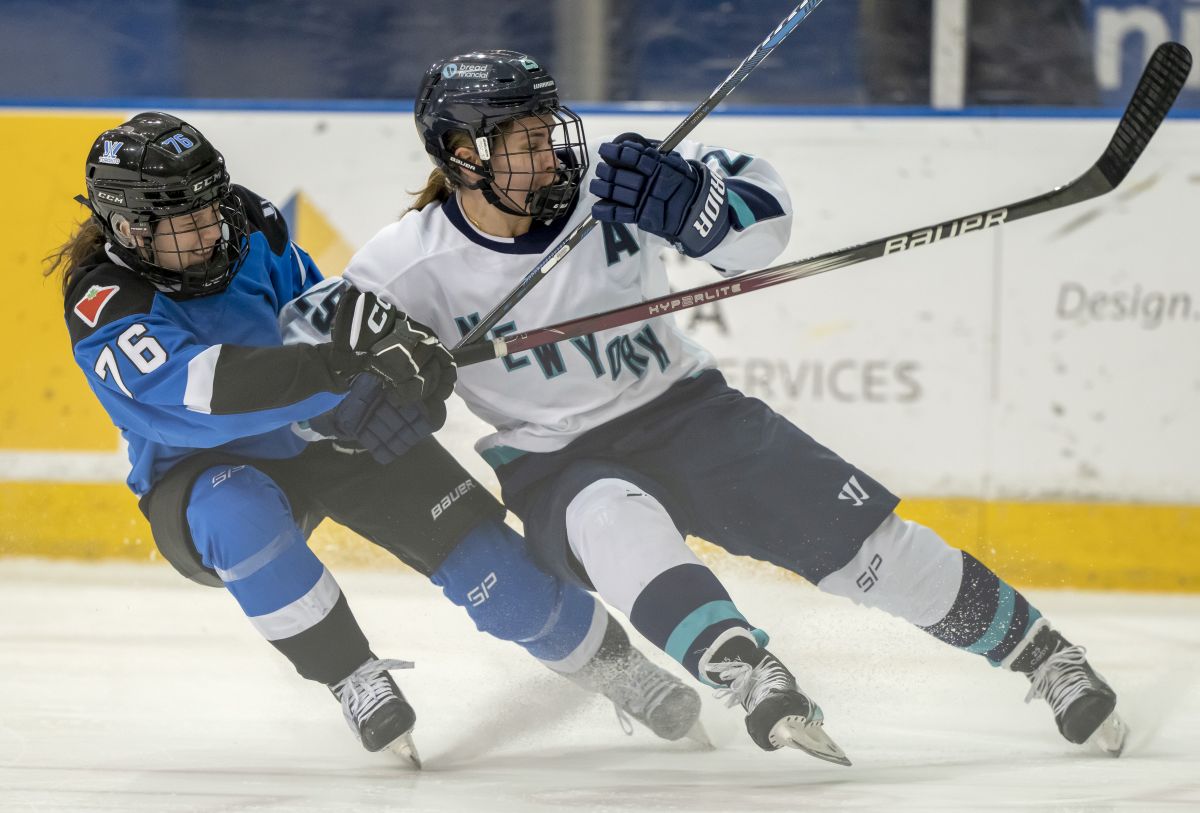The inaugural season of the new Professional Women’s Hockey League is still ongoing, but already, the level of play the league is featuring has caught the attention of sports fans at the arenas where the games take place and on television broadcasts.

“It’s been more than I ever would have imagined,” Howie Draper, a legendary women’s hockey coach from Edmonton who is now the bench boss for New York’s PWHL team, told Global News about how the league has been received so far. “I think it’s been outstanding.
“To get the kind of media attention that we’re getting over here — all of our games are being covered, whether you’re in the (United) States or you’re in Canada, to get the numbers out for the games — man, it’s been beyond anything I could have imagined.”
Draper arrived in the Big Apple ahead of the PWHL’s first-ever season with an astonishing list of achievements on his coaching resume.
In 22 seasons as the head coach of the Pandas, the University of Alberta’s women’s hockey team, he led his players to a staggering U Sports national championships and won four U Sports coach of the year awards.
Draper’s New York team currently occupies fifth place in the six-team PWHL. He told Global News that there have been a number of challenges presented by transitioning from university-level hockey to professional hockey, and by joining a league that is still in its infancy.
“New place, new people, new team, new league — pretty much everything was new,” he said as he recounted his move to the largest city in the United States. “It’s been a great experience. A lot of really great people — great athletes of course.
“We’ve got a lot of work to do with our team and I think we’re all very committed and striving towards the reaching of our goal.”
Among the challenges, Draper lists adjusting to the PWHL schedule as one of the biggest for him.
“You don’t have the luxury of working with athletes from a Monday to a Thursday and sort of taking the team and bringing it through that period of time to prepare for your upcoming Friday (or) Saturday games (as it is done at the university level),” he said. “So finding time to connect with your athletes and give them the information that you really feel you need to give them is a lot more challenging as it relates to our scheduling, because sometimes we’ll have two games in three days, sometimes we’ll have one game in five days. It’s just so varied.”

Get breaking National news
He also said coaching older, professional athletes has been something he has needed time to get used to.
“University students are — they’re still trying to figure themselves out,” he explained. “From a coaching perspective, maybe at times it makes things a bit easier because they’re very open to new ideas at that time.
“When you’re dealing with players that have played the game for a long time and they’ve had a lot of strong coaches in the past, they’ve got some fairly strong ideas of what they need to do to be successful, and often times they’re right. So for me, it’s finding that balance of maybe empowering them more and giving them an opportunity to help steer the ship a little bit more than I might with university athletes.”
Draper also noted the PWHL features players from different countries and in some cases the differences in “styles are actually very uniquely entrenched.”
“So we all have to kind of get on the same page there and take everything we can from every individual.”
While Draper is plying his trade in New York, he has not officially left his position with the Pandas in Edmonton. The university allowed him to take a leave. In the meantime, the Pandas sport an impressive 19-3-4 record this season while playing for acting head coach Darren Bilawchuk, who has coached with Draper over the years.
“He’s going to be great wherever he goes and whatever he does,” Bilawchuk said of Draper. “It’s fun watching him at that level.
“(We still) chat about hockey and the two teams and bounce ideas off each other … just like we used to do in the coaches room when we were together.”
Draper says he is not at all surprised to see how successful the Pandas have been in his absence.
“Darren’s an outstanding coach and I think it’s really good for the team to have a new voice in the dressing room,” he said. “At no point did I feel the team would be left in a tough spot if I were to step aside.
“(Things Bilawchuk has done) are really taking the team to the next level, and that’s great to see.”
Pandas goaltender Halle Oswald spoke glowingly about Draper’s coaching ability and how he is helping to shape the PWHL’s identity in its inaugural season.
“You can see how Howie brings his experience here into the new league,” she said. “The team looks strong and fast, and that’s definitely something he’s pushed through my career and he’s bringing that into the PWHL.”
Oswald said in general, the PWHL has been presenting fans with “incredible, incredible hockey.”
“Fast, physical — it’s everything that you want to see showcased.”
Bilawchuk said he is heartened to see the PWHL being a place where female hockey players are “able to compete at that level” and for the league to “get the support that it’s getting.”
He said the league is inspiring and motivating for Pandas players and other female hockey players at the university level.
“Seeing that there is some place to go, that it’s not just the end of the road for their hockey careers.”
Draper said that as with any massive new venture, the PWHL’s early success has not come without challenges or occasional “glitches” but noted that at every level and in every department of the league and its teams, everyone continues to learn.
“I think we need to show that it’s going to be a sustainable product,” he said. “The vast majority of the steps that we take forward are really advancing the sustainability of this product. I feel like the games have been great.
“All of the players are playing at an intensity that, it’s at 100 per cent. They certainly recognize how momentous this opportunity is and they’re putting everything they can into it.”
Draper noted it has been a personal challenge moving from Edmonton to the New York area.
“I must admit it was daunting to start off with,” he recalled, noting it was also exciting at the same time. “There’s a lot more people and a lot more traffic … It’s a different culture in many ways than it is back home in Edmonton.”
He said his wife has come to visit a few times now and that has helped to make New York and nearby Stamford, Conn., where he currently resides, “a little bit more like home.”
“With all those challenges, I think it’s been great,” Draper said of the new city, the new league and his new role in the PWHL’s largest market.
–With files from Slav Kornik, Global News












Comments
Want to discuss? Please read our Commenting Policy first.